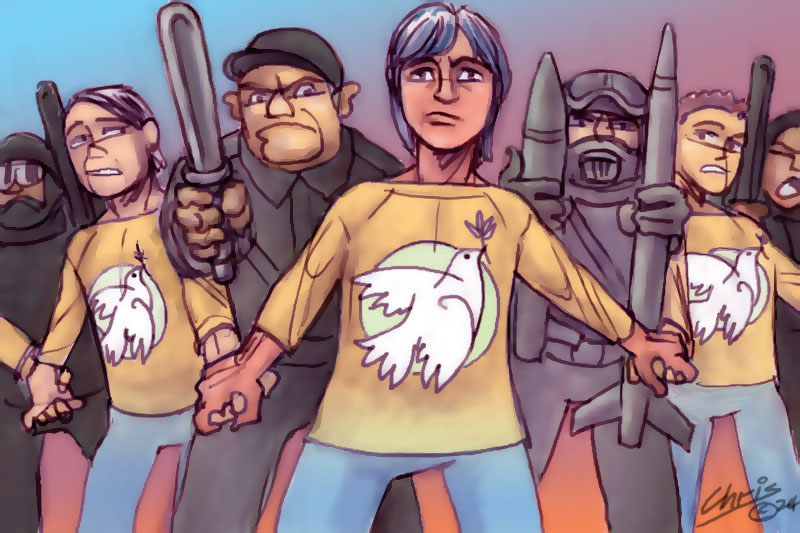Peace is an elusive (some might sneer, illusory) concept. Certainly, while we are happy to exchange the sign of peace at Mass, thinking about what that might actually mean is harder. We are good at dissociating our everyday relationships from the broader world in which we live.

It’s also tricky, because working for real peace means eschewing stereotypes of goodies and baddies. People usually have set views of conflicts based on their idea of history, their religious and cultural start points and often superficial media portrayals designed for headlines. As I and many others have elsewhere suggested, the conflicts in Ukraine, Syria, Georgia, Sudan and elsewhere have a lot more moving parts than Western media – often with their own agendas and tight deadlines and with little knowledge of the local languages and cultures – have the time or inclination to report.
In one case with very current relevance, while the groups which became Al Qaeda were the West’s good guys when they were attacking the Soviets in Afghanistan, they became rather less popular after the attacks in the US in September 2001. Once removing Bashar al Assad (once himself a torturer of choice in the US’ “extraordinary rendition” programme) became a US priority, however, Al Qaeda were (and remain) “on our side” once again. Nevertheless, you wouldn’t know any of this from the fairly superficial media coverage of the Syrian conflict which rarely alludes to any of this complexity.
This, of course, has its impact on peace organisations, which by definition, depend on mobilising public support against wars. Like anyone else, they run the risk of kneejerk responses to complex issues and can become unwittingly co-opted by one or other party to the conflict. So it is that while (some aspects of) the Ukraine conflict have been the focus of attention for a while, the conflicts in the Democratic Republic of Congo, Myanmar and Haiti have very rarely lit up Western human rights radars. Often, the best and safest course to peace is simply to try and persuade foreign governments to stop interfering – especially given the re-emergence (as in the Cold War) of the proxy war as a great power vehicle of choice to expand influence.
'In our day, where war, like all other profitable activities, are privatised, organisations of state and civic society are also implicated in questions of whether their contractual relationships impact their stance on matters of war and peace.'
Nevertheless, for people of faith, the fact that peace making is difficult isn’t an excuse not to try. Embarking on the process, however, does mean that we should be wary of pre-packaged narratives and open to understanding the complexities of situations and the long and often tangled roots of conflicts. Organisations like Pax Christi (of which, full disclosure, I am a member) emerged in the wake of World War II seeking to bring Christian spirituality to the complex work of reconciling divisions. Like the UN, they tend to see peace as something grounded not just in an absence of physical violence but also in the conditions of living that make peace workable – sometimes called “human security”. This embraces a vision of human flourishing which looks to ethical use and sharing of resources and an end to the exploitation of other humans or the natural environment. As such, peace is conceived as a much more holistic venture than merely silencing the guns.
Still, silencing the guns is very much a part of the enterprise in a world where war is extremely profitable. We live in an age where the catch-cry, “never again” after the Nazi Holocausts of disabled people, Jews, Roma and Slavs has instead become “over and over again” as various groups of people are once again expendable in wars of choice around the world. In our day, where war, like all other profitable activities, are privatised, organisations of state and civic society are also implicated in questions of whether their contractual relationships impact their stance on matters of war and peace: whether those organisations be academic institutions or federal or state governments.
One perennial conflict in which Australian institutions have chosen to invest, in every sense of the word, has been the interlocking wars in the Middle East. While these are as difficult as any to disentangle, a growing consensus as to the issues is emerging from Israeli civil society, the International Court of Justice, the International Criminal Court and elsewhere. Pax Christi Victoria (on whose committee I sit) has also spoken out on this, urging Australians to sign this petition suggesting more steps to assist both Israelis and Palestinians to a just peace. We welcome others to both sign the petition linked there and otherwise to join the discussion.
The Pax Christi petition calling for a just peace in Gaza and Lebanon can be found here.
Fr Justin Glyn SJ, General Counsel of the Australian Province, was appointed by Pope Francis as consultor to the Dicastery of Laity, Family and Life.
Main image: Chris Johnston illustration.